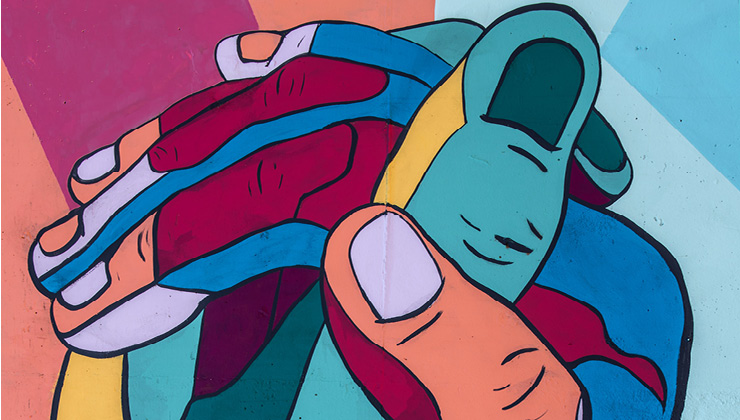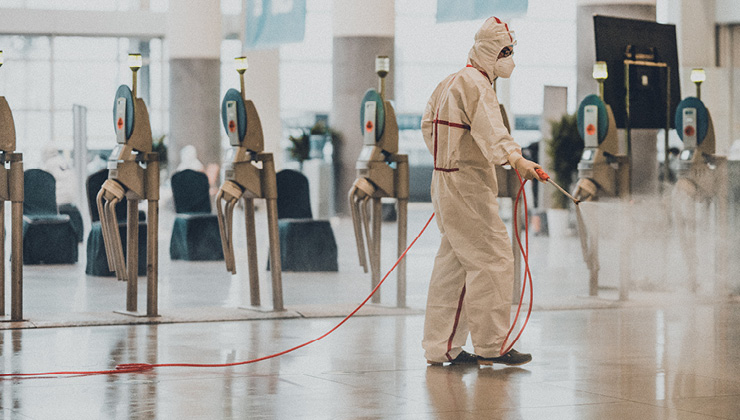The implementation of Colombia’s Peace Accord has faced many challenges, including the rising violence against Indigenous communities and social leaders and the prioritisation of large-scale economic interests. Elena B. Stavrevska details how the COVID-19 pandemic and the government’s response only exacerbates these challenges and jeopardises safeguards put in place to ensure the inclusion and survival of Indigenous communities.
During a research visit to Colombia just before the first cases of COVID-19 were reported in the country, a woman from the Indigenous communities living in Amazonia described peace to me as “harmony, territories without violence, clean of armed groups and mining, rivers without mercury… I believe peace is that – territories free of crops for illicit use, illegal mining, armed actors, and having the opportunity to benefit from state programmes to have a full life (vida plena), which is what we call peace. We do not call peace, peace, as it is understood here. Peace is harmony in the territory, living well (buen vivir), living fully, in a good environment.”
This sentiment has been conveyed to me by many people from different Indigenous communities, from different regions of the country, with different experiences of violence. This sentiment and its vision of peace has become ever more important in the context of the current global crisis yet somewhat less likely considering the response to the pandemic by the current government of president Iván Duque, especially vis-à-vis Indigenous peoples and territories. The COVID-19 crisis is unfolding in the midst of the implementation of the Peace Accord signed in 2016 by the then Colombian President, Juan Manuel Santos and the FARC-EP. The crisis also exposes the inequalities and contradictions that made peace before the pandemic, during and after it, ever so elusive.
Praised as one of the most inclusive and comprehensive peace agreements, the Accord has proposed three approaches to building peace:
(1) differential, recognising that different groups in the society have suffered differently during the conflict and thereby paying special attention to the fundamental rights of those groups, including women, “indigenous peoples, children and adolescents, communities of African descent and other ethnically distinct groups,” campesinos and campesinas (small-scale and family farmers), persons with disabilities, people displaced as a result of the conflict, older adults, and lesbian, gay, bisexual, transgender and intersex persons;
(2) gender-sensitive, recognising the role that gender norms play in shaping societal expectations and the specific impact that the conflict has had on women and girls, and
(3) territorial, recognising the unequal impact that the conflict has had on different territories and communities within the country and the need to address “the economic, cultural and social needs, characteristics and specific features of the territories and communities of Colombia, thereby guaranteeing socioenvironmental sustainability.”
As part of the differential and territorial approaches, the Accord has included a so-called ethnic chapter, which guarantees the rights of Colombia’s ethnic communities and aims to restore the rights that have been violated or lost as a result of the conflict. The chapter is in line with the 1991 Colombian Constitution that recognised the country’s ethnic and cultural diversity, granting “ethnic groups”, including Indigenous and Afro-descendant peoples, land rights and political power that the state must protect. Importantly, the Constitution also recognises Indigenous territories (known as resguardos or reserves), which cover nearly one third of the country’s area and where 57.2% of the Indigenous population lives, as entities autonomously governed by Indigenous people, within the constitutional limits.
The implementation of the Accord, however, has been riddled with difficulties, and the implementation of the ethnic chapter and the gender provisions has been significantly lagging behind. Additionally, violence in many of the Indigenous territories has continued, if not intensified, in the aftermath of the signing, with Indigenous and social leaders being murdered in the hundreds, which has been linked to different powerful actors and economic interests aiming to exploit the land and extract natural resources. According to a study by the Observatory of Territorial Rights of Indigenous Peoples of the Technical Indigenous Secretariat of the National Commission of Indigenous Territories, which analyses the period August 2016-December 2019, the number of murdered Indigenous leaders has gone up to 83 in 2019, from 68 in 2018 and 38 in 2017. The situation has not improved in 2020, with 136 social leaders and human rights defenders, many of whom were Indigenous leaders, murdered thus far. The pandemic has further exposed not only the overall violence faced by social leaders, but also the specific types of gendered violence that female activists and social leaders face.
In fact, the current pandemic sheds light on the underlying contradictions and processes that make peace in the sense described above, and even in the differential and territorial sense included in the Peace Accord, ever more distant. At the bare minimum, the two visions of peace are based on an assumed trust in the government and its institutions to respect and protect the lives and rights of individuals and communities in line with their commitments under the Peace Accord and international obligations. However, in the context of a historically troubled relationship with the state and especially with the current government, despite President Duque’s approval ratings increasing lately among the general population, the trust of the Indigenous population in the government has further deteriorated given the (mis)handling of the pandemic in relation to Indigenous peoples and territories in particular in four specific ways.
First, with the country in lockdown since 25 March, the killings of social and Indigenous leaders have increased. Being confined to their homes and thus easy to locate, often without the witnesses there might be in public places, the reported number of killings of social leaders in the first 82 days of the lockdown is 50. Many of them have been Indigenous leaders. Despite numerous calls to stop the militarisation of their territories even before the quarantine, let alone during it, there has been little to no acknowledgement from the national government of either these requests or the violence itself.
Second, despite countrywide measures for containment, the mining and extractivist activities by multinational corporations have resumed, many of which take place in Indigenous territories. The lockdown largely not only prevents those who have been resisting such projects from organising, but also exposes them to further risks, as noted above. But even more, the movement around those activities further endangers the Indigenous populations, not solely in terms of the virus being spread, but also through the presence of mercury, which has resulted in deaths, maternity complications, and children born with deformations. Colombia’s 2018-2022 National Development Plan focuses on mining and energy projects as key economic component, which in many ways undermines inclusive peace efforts and the core goal of the territorial approach. Additionally, the permission for these intrusions in the territories even during the pandemic further affirms the perception that the current government prioritises economic interests over Indigenous and rural lives more broadly.
Despite numerous calls to stop the militarisation of their territories even before the quarantine, let alone during it, there has been little to no acknowledgement from the national government of either these requests or the violence itself.
Third and related, with the constitutional reform in 1991 and the ratification of the International Labour Organisation Convention 169, ethnic groups have been given the right to free, prior, and informed consultation (consulta previa) on issues pertinent to their status, allowing them to unify and articulate actions to defend their lives and territories. Consulta previa was also integrated in the Peace Accord, as part of the differential and territorial approaches and as the main safeguard of ethnic communities’ rights in its implementation. This also includes consultation on granting access for extractive megaprojects in the territories. However, as part of the COVID-19 measures, the Duque government has proposed a simplification of the prior consultation process, especially for large-scale mining and hydroelectric projects, under the guise of development and avoiding an economic crisis. This simplification includes virtual consultations to replace in-person ones. With large parts of the Indigenous populations living in rural territories without the necessary technology and infrastructure, virtual consultations are not only one more way of marginalising the voices of remote Indigenous communities, but also a violation of their constitutional rights.
Finally, the pandemic has further revealed the profoundly systemic vulnerabilities and inequalities, especially in terms of unequal access to health care and basic infrastructure that Indigenous populations in the territories face, as a result of decades of violence and underdevelopment. With little to no access to health services in their proximity or potable water and sanitation infrastructure, Indigenous communities have been rightly concerned about the consequences if the virus spreads, fearing for their survival. This is in addition to the lockdown bringing into question the livelihoods of many Indigenous people, who work in the informal economy. Some Indigenous communities, such as the Wayuu people in La Guajira, are even more vulnerable due to their location, facing food shortages and malnutrition. Different national Indigenous organisations have asked for humanitarian aid and medical help, which has been promised but not delivered. In the meantime, abandoned by the state, they have turned to traditional medicine, spiritual healers, and a closing of their territories for movement, to prevent further spread. In some places, such as Cauca, this has led to further violent clashes with both legal and illegal armed groups.
the pandemic has further revealed the profoundly systemic vulnerabilities and inequalities, especially in terms of unequal access to health care and basic infrastructure that Indigenous populations in the territories face, as a result of decades of violence and underdevelopment.
These issues combined show the severity of the current situation for the survival of many Indigenous communities, as well as the impact that the way the government has responded to the pandemic will have on the peace process. The disregard of certain constitutional rights and the prioritisation of large-scale economic interests over Indigenous lives can undermine the advances made with the Peace Accord, further erode trust in the government, and make differential, gendered, and territorial peace, let alone peace as buen vivir, ever more uncertain.
*This post is intended to be the first of a series of blog posts on the peace process in Colombia and how it has affected and been affected by Indigenous people, and Indigenous women in particular.
This blog is part of a project that has received funding from the European Research Council (ERC) under the European Union’s Horizon 2020 research and innovation programme (Grant agreement No. 786494)
Image: dawn paley (CC BY-NC-SA 4.0)
The views, thoughts and opinions expressed in this blog post are those of the author(s) only, and do not necessarily reflect LSE’s or those of the LSE Centre for Women, Peace and Security.





